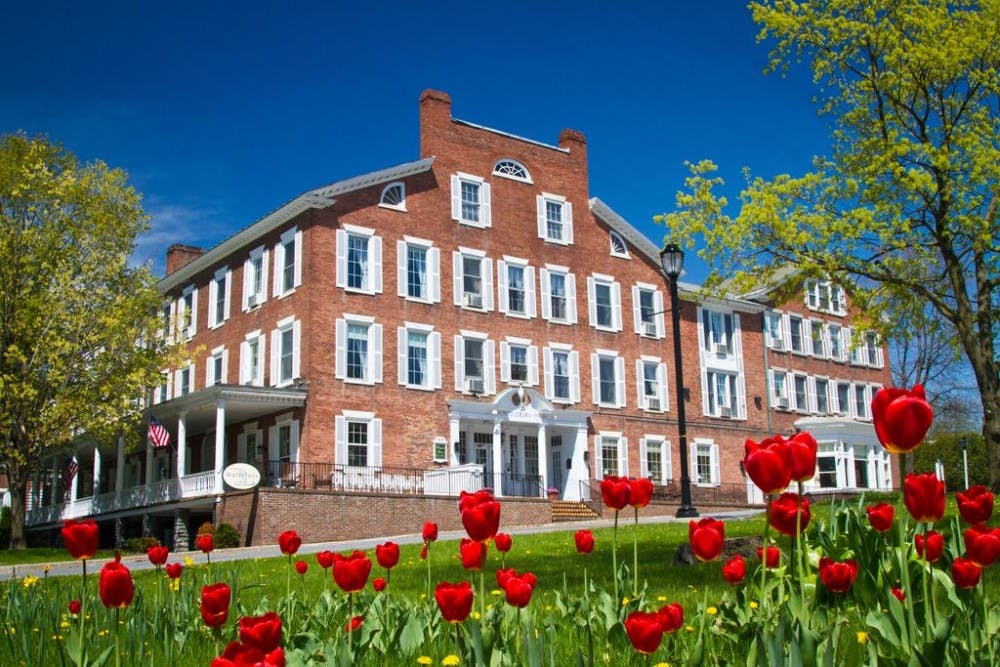The ubiquitous pressure to stay home to slow the spread of the novel coronavirus, formalized by Governor Scott’s statewide “Stay Home, Stay Safe” mandate on March 24, begs the question: what if you don’t have a home to stay in?
In an effort to answer, local nonprofits such as the John Graham Shelter, Charter House and WomenSafe have been working together to move dozens of Addison County’s housing-insecure into vacant rooms at the Middlebury Inn, Sugar House Motel, Courtyard Marriott and Middlebury Sweets Motel. Middlebury College Dining has joined the effort as well, donating three fresh Proctor-concocted meals to the relocated Vermonters each day.
The rooms are subsidized by a state voucher system that is typically implemented to shelter those living outside during Vermont’s frigid winters. In the face of Covid-19, the state declared such “adverse weather conditions” to allow continual voucher distribution to those who need to self-isolate safely. In Addison County, the program now serves between 47 and 50 residents.
Ongoing medical conditions and homelessness often go hand-in-hand, as do shelters and close quarters, explained Jubilee McGill, the primary project coordinator at the John Graham Shelter. This leaves those in need particularly vulnerable to Covid-19.
“Shelters are close communal living spaces where things are more likely to spread,” McGill said. “The state has worked really well to make sure that the people who are highly vulnerable and without permanent housing are able to socially isolate somewhere.”
The program’s organizers have also recognized that self-isolation necessities go beyond housing security. They contacted Middlebury College Dining, who immediately agreed to donate food to those in need. The Proctor Dining Hall staff, still working to prepare food for the 100-odd students remaining on campus, now package two hot meals per day from the pre-planned menu, as well as a cold breakfast for the next day delivered with dinner.
The lunch and dinner meals typically consist of the prepared entrée, vegetable, starch and dessert, while breakfasts include a combination of muffins, fruit, bagels or cereal. As Middlebury College struggles to maintain staff employment after most students have left campus, the donations also generate hours for dining hall workers.
“This program certainly helps with keeping the staff employed,” said Dan Detora, Middlebury’s Executive Director of Food Service Operations in an email to The Campus. “The staff are happy to help and happy to continue to be working. They feel like this is their way to help the community in these unprecedented times.”
Once prepared, the dining staff leave the meals on the Proctor loading dock, where they’re picked up by John Graham Shelter staff and delivered to the doorsteps of those in need.
The meal delivery service is both a great way to provide nutrition to the food-insecure and to minimize contact between people who are self-isolating, McGill explained. “We’re ensuring that there’s not a lot of people coming in and out, and that the meals are delivered safely for everyone’s health,” she said. “It feels very dark and scary at times, but I think getting that meal they feel remembered and seen.”
Walter Stugis, chair of Charter House’s board of directors, also expressed his gratitude in an interview with The Campus last week. “God bless Middlebury College,” Stugis said. “This is all while operating to serve the students who are still living on campus. It’s amazing.”
Organizers and volunteers at the nonprofits have also begun extending their delivery services to include personal hygiene products like shampoo and toothpaste, as well as items to keep residents entertained during self-isolation, such as art supplies, puzzles, books, magazines and decks of cards.
“We also want to make sure we’re paying attention to their emotional health,” McGill said, adding that the organizations are working with Middlebury College’s Center for Community Engagement to connect their clients with student volunteer “buddies” to talk to. “We’re thinking to have someone else who they can vent to and talk to and potentially advocate for them as needed.”
Addison County’s nonprofits plan to continue housing and feeding those in need indefinitely.
“I think it really helps for people out in the community to hear good stories and know that things are being done,” said McGill. “Makes us all feel a little less lost."
Correction April 9, 2020: A previous version of this article referred to the John Graham Shelter as John Graham House. Additionally, meals prepared by the college are picked up by John Graham Shelter staff, not staff of the Charter House.
Nonprofits house homeless in Middlebury hotels; dining service delivers meals

Courtesy Photo
As Vermont heightens social distancing advisories, local nonprofits have moved many of Addison County housing-insecure from shelters into hotels and motels, including the Middlebury Inn on Court Square.
As Vermont heightens social distancing advisories, local nonprofits have moved many of Addison County housing-insecure from shelters into hotels and motels, including the Middlebury Inn on Court Square.
Comments



